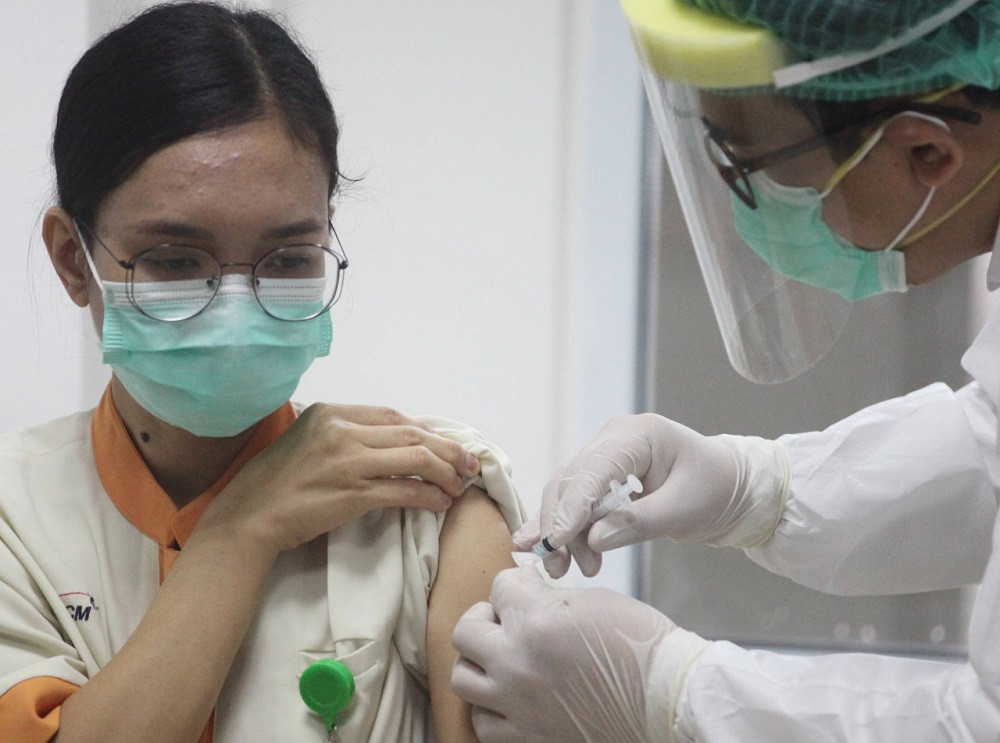Popular Reads
Top Results
Can't find what you're looking for?
View all search resultsPopular Reads
Top Results
Can't find what you're looking for?
View all search resultsJokowi may allow private sector to offer vaccinations
Kadin chairman Rosan Roeslani likened the proposal to expediting a visa
Change text size
Gift Premium Articles
to Anyone
P
resident Joko “Jokowi” Widodo is considering a plan to allow private vaccinations in the country as his administration races to inoculate 181 million citizens while COVID-19 cases continue to rise – despite experts’ concerns about the impact of the policy on less-fortunate groups.
Jokowi said on Thursday that the private sector’s involvement in the vaccination effort might accelerate the process, which is currently expected to take up to 15 months.
“We haven’t decided yet,” Jokowi said during a virtual event. “We have to speed up; we need as many [resources] as possible. Especially if businesses bear the costs themselves, why not?”
Businesses might be able to offer different brands of vaccine than those used in the government program, he added.
The country’s business players have proposed that they participate in the inoculation program by distributing the vaccines to their employees and their families, as well as possibly the public at large.
Indonesian Chamber of Commerce and Industry (Kadin) chairman Rosan Roeslani said on Sunday that the private sector was only “providing options”, likening the proposal to visa applications, where those who wanted to speed up the process could pay more.
Rosan added that the private sector could import COVID-19 vaccines on its own or purchase doses from the government. Indonesian businesspeople, he said, had approached producers such as American firms Pfizer and Moderna, British firm AstraZeneca and the producers of Russia’s Sputnik vaccine.
Publicly listed Bank Central Asia (BCA) president director Jahja Setiaatmadja said on Tuesday that the private sector was willing to spend to procure the vaccine, noting that inoculating employees offered more certainty for producers as they were expected to have more funds than people with uncertain sources income.
However, as in many other countries, the Indonesian government has been single-handedly running the vaccination program, from procuring the vaccines to administering the shots.
The government has secured 426.8 million doses of COVID-19 vaccines, mostly from Chinese pharmaceutical company Sinovac Biotech and American vaccine manufacturer Novavax.
The government’s vaccination program, which began earlier this month, aims to inoculate some 1.3 million medical workers from January to February. Between March and April, it seeks to vaccinate 17 million public workers and 25 million elderly citizens. The program for the public at large is expected to start in April or May.
As of Wednesday, 60,815 people had received a dose of the COVID-19 vaccine, according to Siti Nadia Tarmizi, the Health Ministry’s spokesperson on vaccine affairs.
The President hopes the vaccination program will conclude within a year.
The country confirmed 11,700 new COVID-19 cases on Thursday, bringing the national tally to more than 951,000.
Health Minister Budi Gunadi Sadikin said that while the state was open to the private vaccination proposal, he wanted to ensure that the vaccines would remain free of charge and accessible to all citizens regardless of their economic status.
“My goal as a regulator is that I want the vaccination to be as fast as possible, as widespread as possible and as affordable as possible for the state budget,” said Budi.
Businesses are waiting for the government to decide whether they will be able to import vaccines and with what level of oversight, according to Kadin deputy chairwoman Shinta Kamdani.
Griffith University global health researcher Dicky Budiman said on Thursday that in the current early stage of the vaccination drive, the discussion of widening coverage through private vaccination was "irrelevant" to the program’s priority, which was to protect at-risk groups, including elderly people and those with comorbidities.
-- Ardila Syakriah contributed to this story










